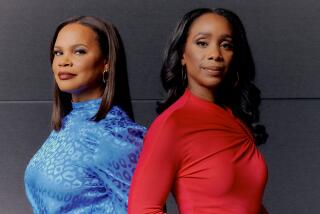PBS Uses ‘Wide Angle’ Lens to Take Global Snapshots
- Share via
PBS’ documentary-interview program “Wide Angle” premieres Thursday with two missions:
The first is to take an in-depth look each week at a global issue that could affect Americans.
The second: to get people to watch the show--in the summertime, when people are more likely to be thinking of baseball and the beach than global problems.
“Wide Angle,” given a 10-week run, will be hosted alternately by British veteran news-anchor Daljit Dhaliwal, recently hired by CNN International, and James P. Rubin, former assistant secretary of state.
Executive producer Stephen Segaller, of New York’s WNET, called the program “a kind of weird hybrid” but wants to make “Wide Angle” a continuing series. He said it will begin by briefly putting into context a 42- to 45-minute documentary--originally commissioned films, international co-productions or acquisitions--focusing on events that could have global significance.
“The filmmakers we’ve commissioned have done wonderful work and won every important award,” said Segaller. “What we’re after is a combination of a great filmmaker and an important, timely story.”
Using narrators but not on-camera reporters, the documentaries will focus on the people and issues behind news stories and relate them to events and trends. After each film, the host will interview a guest with expertise in that field.
“When I originated the idea for this series, I wanted to go for broke, as it were,” said British-born Segaller. “It’s all international, and if we’ve got 45 minutes of reportage, the missing component to add is to have the rest of [the show] bring it home to the American audience.
“Usually the object is to have two guests who sit there and disagree with each other. My objective is to present a sense of why this story matters to American viewers. Clearly when you pick a guest, you get one point of view, but the job of the host is to ask the right questions.”
The opening hour, hosted by Rubin, will focus on Saddam Hussein’s weapons of repression and the wider threat they imply. “Saddam’s Ultimate Solution” is produced by British filmmaker Gwynne Roberts, the first Western journalist to enter northern Iraq after the Gulf War and who has filmed there over the last five years.
The film will look at Iraqi Kurdistan, where Hussein has been waging a genocidal attack using biological weapons. Segaller believes that “in the event of a war with Saddam, the Kurds will be a vital force, perhaps the next Northern Alliance.”
The second program will focus on China’s economy.
Rubin has served as assistant secretary of state and chief State Department spokesman; as a State Department policy advisor and senior advisor; and as spokesman for Madeleine K. Albright, the former U.S. ambassador to the United Nations and former U.S. secretary of state. Rubin has spent time in front of television cameras, but not as a journalist.
“For me it’s a big challenge,” he said. “I’ve obviously lived and breathed the significance of journalism on policy my whole life. So I hope to hover right in that place where it’s a conversation between two intelligent people about why you should care about this.
“I would say there is a total void in American television for a 45-minute, no-commercial documentary of this style. The idea is you take a topic that is not necessarily news of the week, but a topic that we all collectively deem to be important, and you have a compelling film that has real characters, real people in it from the perspective of this place, rather than from the perspective of Washington policy.”
Rubin said that as interviewer, he will focus on the importance to Americans of the issue presented in the film, what the consequences may be and what, if anything, U.S. policy should be.
“That’s what I’ve been doing my whole life, either at the State Department, where I was working with experts on a particular region--and I’d say, ‘What’s our policy? Why should we care?’ Or in the Senate, when I worked with the Senate Foreign Relations Committee, which is the nexus of politics and foreign policy. Or previously when I was at the think tank [Carnegie Endowment]. So it’s a perfect fit.”
The interview segment, taped a few days before airing, will be 15 or 20 minutes longer than what is seen on “Wide Angle,” he said. Segaller said the full transcript also will be on the Web site, and the edited version used for the show will be on the site as a video file.
Rubin lives in London with his wife, CNN and “60 Minutes” correspondent Christiane Amanpour, and their 2-year-old son, Darius John. He will commute to New York, the city where he grew up, went to college (Columbia) and still has business interests.
Amanpour gave him a few suggestions for his new television job, he acknowledged. “There are a few things that are different when you’re sitting in a new seat,” he said. “Yes, she’s given me some important tips, the most important of which is to be who you are.”
And he added: “I’m hoping that, post-Sept. 11, people now realize that events around the world can come home to bite us and that there will be at least an openness to [a program such as ‘Wide Angle’] that may not have existed just a couple of years ago.”
Dhaliwal, married in September to an American television journalist, Lee Patrick Sullivan, is a 12-year broadcast veteran. She began her career at BBC, anchoring the international 24-hour news channel BBC World. Two years later she anchored “ITN World News for Public Television.” She also has hosted ITN’s weekly “World Focus,” an international news show.
“She registered with me as someone who has a real drive for international journalism,” said Segaller. “She even has a fan club.”
Dhaliwal said she and Sullivan will move to Atlanta so she can begin anchoring CNNI’s “World News” and “World Report” in August. “I’m absolutely thrilled and excited,” she said. “It’s a broadcaster’s dream. London is where I was born and raised and went to school, but I’m going to love the weather, the heat [in Atlanta]--that’s one thing I won’t miss about London.”
Dhaliwal is a key figure in CNNI’s relaunch this fall with a focus on prime-time audiences in Europe, the Middle East and Africa. Rena Golden, CNNI general manager, said Dhaliwal has “engaging on-screen presence.” In 1999, Dhaliwal was named one of People magazine’s 50 most beautiful people.
“I think I’ve got my hands full,” she acknowledged in a phone interview from London. “I’ll be commuting from London to the United States for each of the five ‘Wide Angle’ programs” that she will host, “spending two or three days getting my research, getting my prep sorted out. Most of the interviews will be conducted in the U.S., mainly Washington and New York. Then I start at CNN; the first of August is when I’m to go on the air.
“There will be an overlap between ‘Wide Angle’ and starting at CNN. Logistically, it will be quite interesting.”
*
“Wide Angle” will air Thursdays at 8 p.m. on KCET-TV.
More to Read
The complete guide to home viewing
Get Screen Gab for everything about the TV shows and streaming movies everyone’s talking about.
You may occasionally receive promotional content from the Los Angeles Times.






